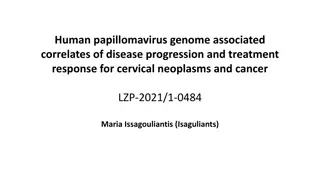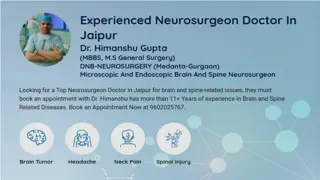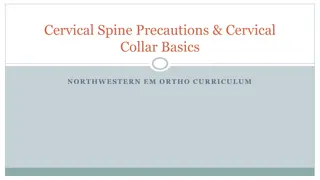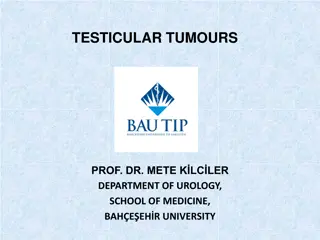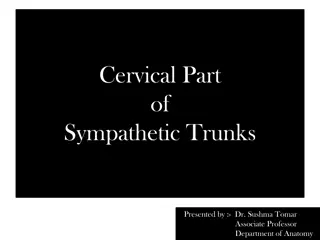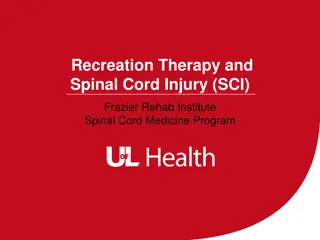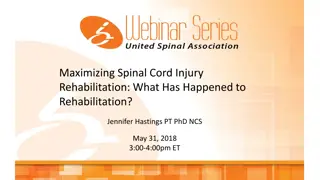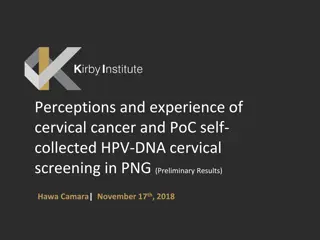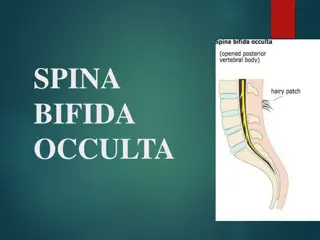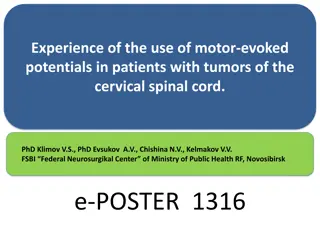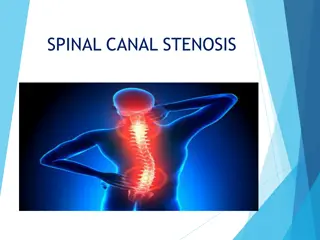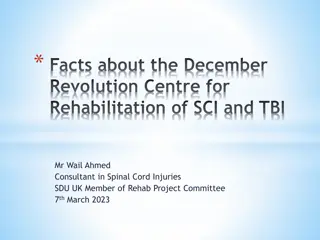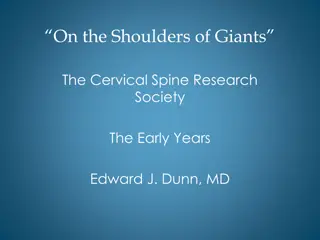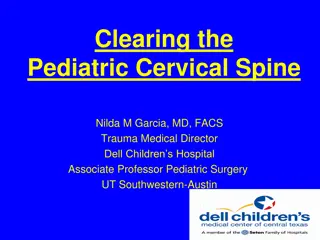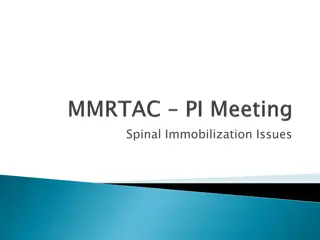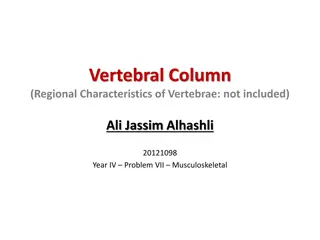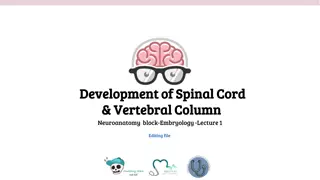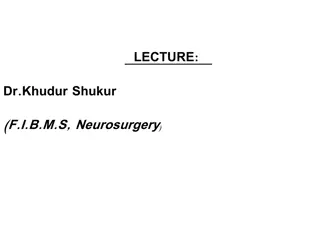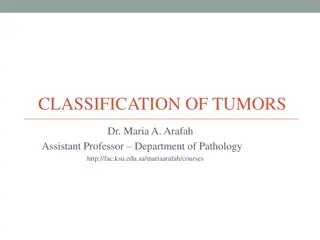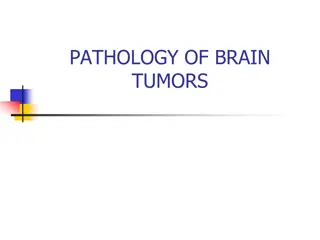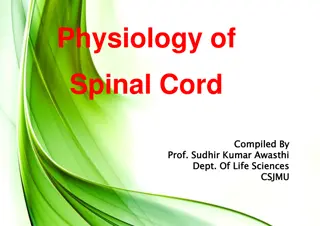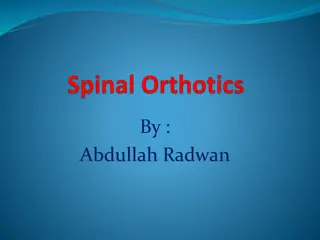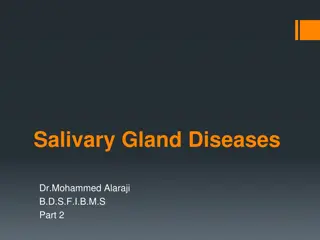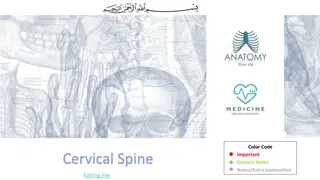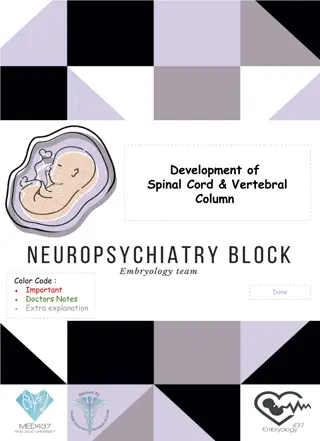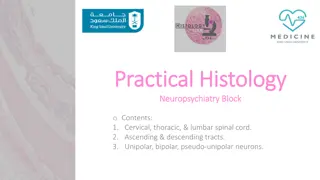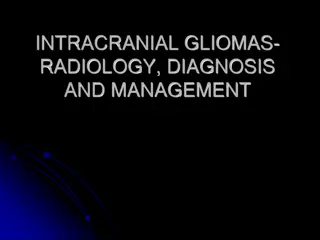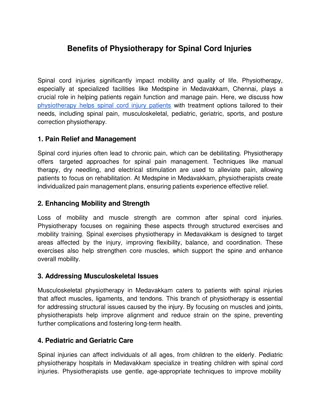Spinal injuries
An overview of spinal injuries, including anatomy revision, types of spinal fractures, assessment, management, and common patterns of injuries. It also covers back pain presentation, red flags, differentials, and the structure of vertebrae. The Denis classification of spinal fractures and the most c
3 views • 40 slides
What you need to know about the HPV Vaccine
Globally, cervical cancer is the fourth most common cancer in women, with 6,04,000 new cases in 2020. Women living with HIV are 6 times more likely to develop cervical cancer, compared to the general population, and an estimated 5% of all cervical cancer cases are attributable to HIV. The contributi
2 views • 7 slides
Investigating Human Papillomavirus Genomes in Cervical Neoplasms
This project focuses on studying the Human Papillomavirus (HPV) genome's association with disease progression and treatment response in cervical neoplasms and cancer. The research aims to genotype high-risk HPVs in healthy and diseased cervix, identify prevalent genotypes, detect genotype drift, cha
1 views • 13 slides
_Best Neurosurgeon Doctor In Jaipur || Dr Himanshu Gupta || drhimanshugupta.com
Dr. Himanshu Gupta is known not only for his mastery of surgical techniques, particularly in microsurgery and Endosurgery for brain tumors but also for his exceptional skills in managing patients requiring trauma, brain, and spine surgeries.\n\nHis focus lies in exclusive neurosurgery, making him a
0 views • 7 slides
neurosurgeon in jaipur-Dr Himanshu Gupta
brain tumor is an abnormal growth of cells in the brain. Tumors can be either cancerous (malignant) or non-cancerous (benign). Cancerous tumors grow and spread aggressively, potentially invading nearby tissues and spreading to other parts of the body, while non-cancerous tumors are usually less aggr
0 views • 5 slides
Cervical Spondylosis: Understanding Symptoms, Evaluation, and Treatment Options
Cervical spondylosis is a degenerative condition of the spine that can lead to neck pain, limited range of motion, and other discomforts. In this case study of an 85-year-old female, the subjective and objective evaluations reveal symptoms and physical findings associated with cervical spondylosis.
1 views • 18 slides
Cervical Spine Precautions & Cervical Collar Basics
Cervical collars, also known as C-Collars, are medical devices worn around the neck to support and immobilize the cervical spine. They are commonly used after trauma or surgery. Trauma patients with blunt traumatic injuries may benefit from C-Collar placement based on clinical judgment. It is import
0 views • 11 slides
Understanding Testicular Tumors: Types, Classification, and Clinical Findings
Testicular tumors are predominantly malignant, with germ cell tumors being the most common type. This article delves into the classification of testicular tumors, including primary and secondary, benign and malignant, germ cell, and non-germ cell tumors. Clinical findings such as painless enlargemen
3 views • 31 slides
Understanding the Cervical Part of Sympathetic Trunks
The sympathetic trunks play a crucial role in the human body, with the cervical part located in front of the transverse processes of cervical vertebrae and the neck of the 1st rib. This part presents three ganglia - superior, middle, and inferior. Sometimes, the inferior cervical and first thoracic
0 views • 25 slides
Comprehensive Recreation Therapy for Spinal Cord Injury Patients
Recreation therapy for individuals with spinal cord injuries at Frazier Rehab Institute focuses on developing life skills, community reintegration, education and support in various areas, leisure education, awareness, and community re-integration. The program provides opportunities for individuals t
0 views • 13 slides
Maximizing Spinal Cord Injury Rehabilitation: Insights and Advocacy Efforts
Explore the journey of spinal cord injury rehabilitation, challenges faced, and advocacy efforts by organizations like United Spinal Association. The impact of sudden onset spinal cord injuries on various aspects of life is highlighted, along with the importance of support and legislative advocacy.
1 views • 27 slides
Perceptions and Experiences of Cervical Cancer and PoC Self-Collected HPV-DNA Cervical Screening
Explore the preliminary results of a study on perceptions and experiences of cervical cancer and point-of-care self-collected HPV-DNA cervical screening. The study highlights the need for improved screening services, introduces WHO GeneXpert PoC HPV-DNA technology, and advocates for global cervical
1 views • 25 slides
Understanding Spina Bifida Occulta: Symptoms, Causes, and Treatment
Spina Bifida Occulta is a common neural tube defect, usually mild and hidden. It affects the lumbosacral area, characterized by vertebral arches not fusing, resulting in spinal processes defects without external protrusion. Common features include dimples, hairy patches, and normal spinal cord. Neur
0 views • 10 slides
Use of Motor-Evoked Potentials in Cervical Spinal Cord Tumor Patients
Neurophysiological intraoperative monitoring using motor-evoked potentials is crucial in evaluating spinal cord function during surgery for cervical spinal cord tumors. This study examines the relationship between neurological changes and intraoperative motor-evoked potentials in patients, aiming to
0 views • 8 slides
Understanding Spinal Canal Stenosis: Causes, Symptoms, and Classification
Spinal canal stenosis is the abnormal narrowing of the spinal canal or intervertebral foramina, leading to compression of nerves and blood vessels. It can result in symptoms such as radiculopathy, claudication, myelopathy, and more. Cervical stenosis presents with arm pain and weakness, while lumbar
0 views • 18 slides
Development of a Tertiary Neurological Rehabilitation Centre in Sudan
The December Revolution Centre for Rehabilitation of Traumatic Spinal Cord and Brain Injuries at Khartoum Teaching Hospital addresses the lack of holistic patient-centered rehabilitation services in Sudan. Following the December 2018 Revolution, the need for specialized care for victims with spinal
0 views • 11 slides
Designing a Safe Bungee Cord for Washy Meet Washy!
Engineering students embark on a challenge to create a safe bungee cord for Washy at Crazy Town. Through story time, defining forces, brainstorming, and discussing cord lengths, they learn about displacement, force calculation, and using Hooke's law for spring constant. The activity aims to measure
0 views • 27 slides
Exploring the Origins and Legacy of the Cervical Spine Research Society
Delve into the early years of the Cervical Spine Research Society, established by pioneers like J. William Fielding, Edward Dunn, and other founding members in 1973. The society aims to foster the exchange of ideas and advancements in the diagnosis and treatment of cervical spine injuries globally.
1 views • 79 slides
Empowering Women in Peru Through Cervical Cancer Screening and Treatment Program
In October 2015, DB Peru launched a program in the Loreto District of Peru to provide cervical cancer screening, diagnosis, and treatment to women in the Lower Napo Valley. Partnering with local communities, the initiative aims to bridge the healthcare gap and improve living conditions. This project
0 views • 8 slides
Pediatric Cervical Spine Evaluation and Clearance - Comprehensive Review
This informative content delves into the significance, assessment, and clearance of pediatric cervical spine injuries, emphasizing the stratification by age groups and the importance of early evaluation. It highlights the need for spinal clearance in all trauma patients, discusses the immobilization
0 views • 21 slides
Spinal Immobilization in Trauma: Case Study and Considerations
A 70-year-old male with trauma after falling 20 feet was managed at the ED, demonstrating tenderness in the mid thoracic spine and other injuries. Despite negative cervical spine imaging, the patient underwent interventions for spinal fractures. The decision to transfer without a backboard highlight
0 views • 34 slides
Understanding the Vertebral Column and Abnormal Curvatures
The vertebral column, extending from the cranium to the coccyx, plays vital roles in protecting the spinal cord, providing support, and facilitating movement. It consists of 33 vertebrae arranged in 5 regions, each with specific functions and characteristics. The column's curvatures, including cervi
0 views • 12 slides
Embryology of Spinal Cord and Vertebral Column Development
Explore the fascinating embryological journey of the spinal cord and vertebral column development, covering topics such as neural tube formation, layers of the spinal cord, subdivisions of mantle and marginal zones, chondrification, ossification stages, spina bifida types, and more. Dive into the st
1 views • 15 slides
Understanding Injuries to the Cervical and Thoracolumbar Spine
Cervical spine injuries are common, especially in the 15-30 age group, with motor vehicle accidents, falls, and sports being major causes. Male individuals are more prone to injuries. Neurological deficits are associated with specific types of injuries, necessitating prompt imaging for spinal cord i
0 views • 20 slides
Understanding Neoplasia: Characteristics and Nomenclature of Tumors
Neoplasia, or new growth, is characterized by uncoordinated growth exceeding that of normal tissues, persistent growth independent of stimuli, loss of responsiveness to growth controls, and local expansion regardless of host environment. Tumors are classified into benign and malignant categories in
0 views • 36 slides
Classification of Tumors: A Comprehensive Overview
Understanding the classification of tumors is crucial in the field of pathology. This detailed overview covers the definitions of neoplasia and tumors, the differentiation between benign and malignant tumors, nomenclature, and characteristics of various tumor types. It discusses the behaviors of ben
1 views • 34 slides
Epidemiology and Pathology of Brain Tumors - Overview and Incidence Statistics
This information provides an in-depth overview of the epidemiology, classification, and pathology of brain tumors. It covers the relative incidence of various brain tumors, including astrocytoma, glioblastoma, meningioma, and others. The data also includes statistics on the occurrence of brain tumor
0 views • 98 slides
Understanding the Physiology of the Spinal Cord
The spinal cord serves as the information highway between the brain and body, allowing for sensory input reception and motor signal transmission. It plays a crucial role in locomotion, reflex responses, and overall coordination of muscle activities. The cylinder of nerve tissue within the vertebral
0 views • 18 slides
Understanding Orthoses: Types, Indications, Mechanisms, and Effects
Orthoses are mechanical devices used to support, stabilize, and protect various body parts. They can be categorized into different types such as cervical, cervicothoracic, thoracolumbosacral, lumbosacral, and sacroiliac orthoses. Indications for spinal orthotics include stabilizing the spine after a
0 views • 34 slides
Overview of Salivary Gland Tumors and Diseases
Salivary gland diseases, including tumors, can affect both major and minor glands. These tumors may be benign or malignant, with common benign tumors like pleomorphic adenoma. Clinical features of salivary gland tumors vary, with slow-growing benign tumors being more common. Pleomorphic adenoma is p
0 views • 27 slides
Understanding the Cervical Spine: Anatomy and Function Explained
Explore the anatomy of the cervical spine, focusing on the 7 vertebrae, their unique characteristics, joint structures, and movements. Learn about typical and atypical vertebrae, key features like foramen transversarium, and the importance of vertebral arch components. Dive into how the cervical reg
0 views • 17 slides
Development of Spinal Cord and Vertebral Column - Doctors' Notes
The development of the spinal cord from the neural tube, layers of the spinal cord, subdivisions of mantle and marginal zones, meningeal layers, vertebral column development, chondrification, ossification stages, spina bifida types, and positional changes of the spinal cord are crucial aspects cover
0 views • 10 slides
Practical Histology: Spinal Cord Tracts and Neurons Overview
This practical histology guide covers the cervical, thoracic, and lumbar spinal cord segments, along with ascending and descending tracts, and pseudo-unipolar/unipolar neurons. It emphasizes key features such as the ventral and dorsal horns, gracile and cuneate tracts, and provides essential informa
0 views • 12 slides
Validation of Plasmalyte in Cordwashing - Cord blood processing and quality control
This detailed documentation covers the validation process of using Plasmalyte in cord blood washing procedures, providing insights into the reasons for washing cord blood units, current standards, acceptance criteria, and the use of validated methods like Sepax cord wash. It emphasizes the importanc
0 views • 16 slides
Intracranial Gliomas: Radiology, Diagnosis, and Management Overview
This comprehensive overview covers the classification, subtypes, and spatial definitions of intracranial gliomas, including astrocytic tumors, oligodendrogliomas, ependymal tumors, neuronal tumors, pineal tumors, and embryonal tumors. It also discusses low-grade gliomas and spatial definitions based
0 views • 38 slides
Neurosurgical Oncology A Complex Field of Cancer Treatment
Neurosurgical oncology is a specialized field of medicine that focuses on the surgical treatment of brain and spinal cord tumors. These tumors can be benign (non-cancerous) or malignant (cancerous), and their location and type can significantly impac
0 views • 3 slides
Neurosurgical Oncology A Complex Field of Cancer Treatment
Neurosurgical oncology is a specialized field of medicine that focuses on the surgical treatment of brain and spinal cord tumors. These tumors can be benign (non-cancerous) or malignant (cancerous), and their location and type can significantly impac
0 views • 3 slides
Benefits of Physiotherapy for Spinal Cord Injuries
Physiotherapy is an extreely important part of treatment for spinal problems. Multiple physiotherapy modalities are useful in relieving spinal pain. Personalisedexercise programs are tailored to each patient\u2019s Specific Problems.
0 views • 2 slides
United Spinal Association: Empowering People with Disabilities
The United Spinal Association is dedicated to enhancing the quality of life for wheelchair users and the broader disability community. With over 75 years of commitment, they empower individuals with spinal cord injuries and disorders to achieve the highest possible quality of life through advocacy,
0 views • 7 slides
United Spinal Association: Empowering Individuals with Disabilities
United Spinal Association is dedicated to enhancing the quality of life for wheelchair users and individuals with spinal cord injuries and disorders. With over 75 years of experience, they provide support, advocacy, and resources to empower people with disabilities to achieve their fullest potential
0 views • 7 slides


